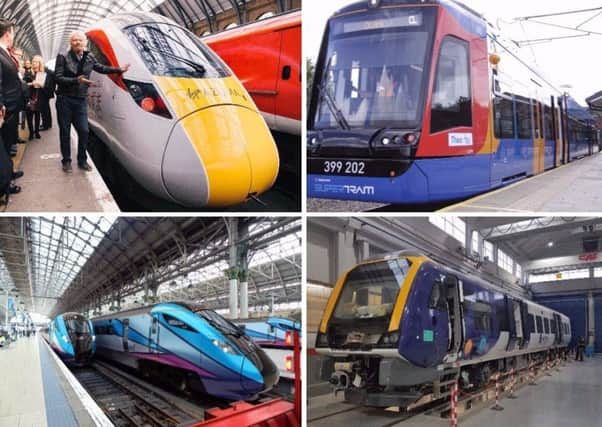Could 2018 be a watershed for transport in the North?


If there is one issue considered by most to be emblematic of the long-standing North-South divide, it’s the gap in transport investment between the two regions.
During 2017, politicians lambasted the Government’s record on the subject, while thousands of people signed a petition calling for more investment after Transport Secretary Chris Grayling scrapped a number of rail electrification projects.
Advertisement
Hide AdAdvertisement
Hide AdThough Mr Grayling insists any talk of a disparity is a myth, in November the Government’s own figures showed that the capital spend per person in Yorkshire had shrunk compared to London’s in the last four years.
Since then, statistics have emerged showing the planned spend on transport infrastructure which suggest the damaging trend may be about to change.
Advertisement
Hide AdAdvertisement
Hide AdCiting the fact that spend in the three Northern regions is £10 higher per head than in the South, Whitehall officials boast of carrying out the “biggest investment in transport in the North of England for a generation”.
To find out what was in store for the next 12 months, The Yorkshire Post approached the region’s transport bodies and leading operators about their plans.
According to Jonathan Spruce, Interim Strategy Director at Transport for the North (TfN), the recently-created strategic body for the region, 2018 is a “watershed moment”.
On April 1, TfN will become a statutory body, the first of its kind in the country, meaning it can speak with one voice on behalf of the North’s 19 transport authorities and make recommendations the Government must consider.
Advertisement
Hide AdAdvertisement
Hide AdA major step will be the publication of its strategic transport plan, a first-of-its-kind piece of work that sets out a £60bn transport vision for the next 30 years.
“It joins up some of the big connections we need to make across the North, from the Cumbrian coast to the North East across that central Pennine belt, North Yorkshire, the M62 corridor and the southern Pennines,” said Mr Spruce. Two priorities in the report are Northern Powerhouse Rail, the high speed line connecting the great cities of the North, and, in the short term, contactless smart ticketing to make public transport easier to use.
But the document also sets out how the transport changes will impact on, and be affected by, skills, business and housing.
Mr Spruce says 2018 will be the year the travelling public “start to see the benefits of the North working as one”, and Yorkshire’s rail operators promise a number of tangible improvements.
Advertisement
Hide AdAdvertisement
Hide AdPerhaps the most eye-catching will be the 65 Azuma trains which will enter service at the start of the December timetable on the East Coast Mainline. Virgin, whose East Coast rail franchise will end in 2020, three years early, says the trains can be seen at a depot in Doncaster prior to being used on the line that runs through Yorkshire from London to Edinburgh.
As part of the roll-out the new train, which reaches 125mph in less than five minutes, will stop at new destinations including Middlesbrough and will regularly go between London and Leeds in two hours.
Inter-city services around the region will also benefit from sparkling new rolling stock. Northern, which runs rail services around the region and has pledged to get rid of its much-maligned Pacer trains by 2020, will this year introduce the first of its 98 new trains as part of an “ambitious modernisation programme”.
They will be capable of travelling at 100mph, will be fully air conditioned, have electronic seat reservation systems, CCTV, power sockets and free wifi.
Advertisement
Hide AdAdvertisement
Hide AdThe firm is refurbishing 240 of its older trains and introducing new and more frequent services, as well as launching Northern Connect, a “fast inter-urban network” in December.
TransPennine Express will in the second half of 2018 be rolling out the first of its 220 state-of-the-art intercity train carriages which will reach speeds of up to 140mph and cut journey times. There will be more frequent services, including six trains an hour between Leeds and Manchester.
The firm’s current fleet will undergo a £32m upgrade, to be complete by next summer, meaning 51 of its trains will be completely gutted and refurbished with brand new seats, carpets and lights, wifi and Netflix-style entertainment by the summer.
Managing director Leo Goodwin said the growth of the company meant it now carried nearly 30 million passengers every year. He said: “That does mean that some times during the day our trains are very busy. These additional seats will make a big difference.”
Year of the engineer
Advertisement
Hide AdAdvertisement
Hide Ad2018 will be the Year of Engineering, a national campaign to increase awareness and understanding of what engineers do among young people, their parents and their teachers.
Jonathan Spruce of TfN said it was vital to use this chance to excite young people about getting involved in engineering, as the people who will deliver the North’s transport infrastructure in the next 30 years are currently of school age.
“It is that young boy, young girl, if they see the trains and see the cranes and see things coming out of the ground, we can say ‘we have 30 years of this and it’s only going to get better’,” he said.